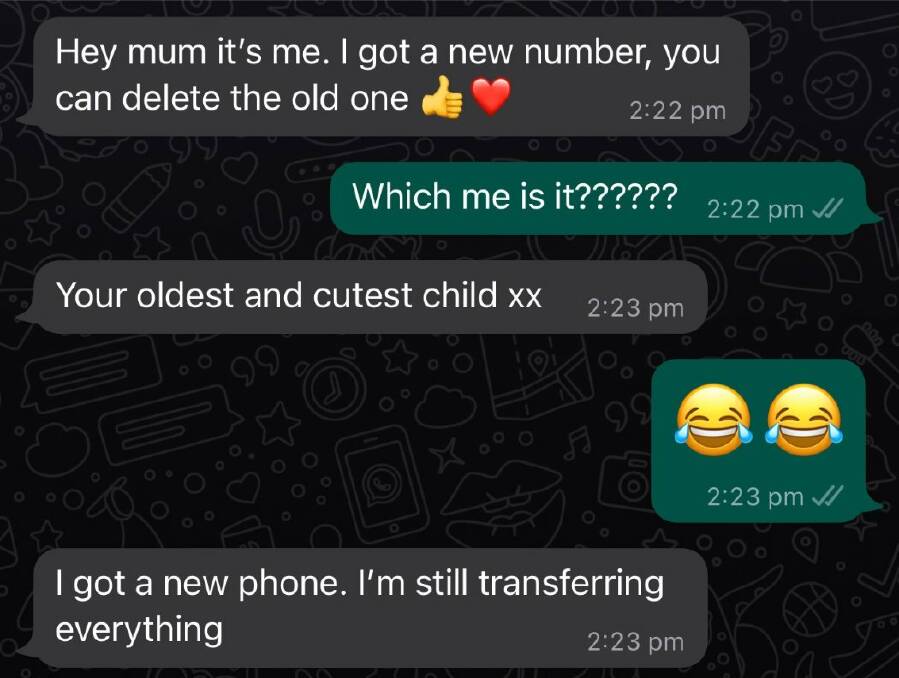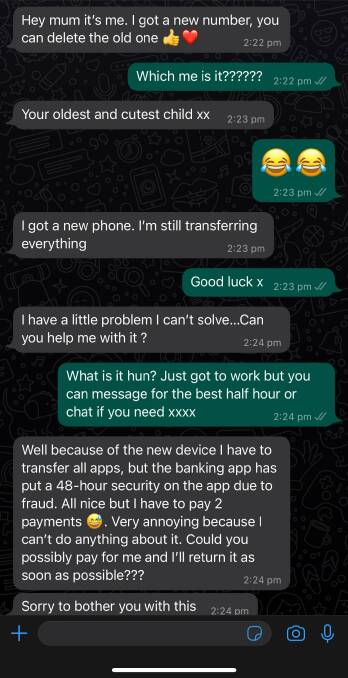
It starts out like any other message an adult child might send to their Mum, but the simple text exchange has scammed more than $2 million already.
Subscribe now for unlimited access.
$0/
(min cost $0)
or signup to continue reading
A warning has been issued by the cybercrime squad asking phone users to remain vigilant after a spike in victims of the scam dubbed 'Hi Mum'.
The scam involves the offender sending a text message from an unknown mobile phone number, to a person on a messaging application claiming to be their son or daughter.
Then, the message states they've lost their phone, telling the victim they're sending from their new number and to delete the old number.
The banking app has put a 48-hour security on the app due to fraud. All nice but I have to pay two payments.
- Example of scammer's message
Scam example: "Hey Mum it's me. I got a new phone number, you can delete the old one. I got a new phone. I'm still transferring everything".
Once the victim engages in conversation, the offender asks to borrow money or have a payment made on their behalf. This generally includes an excuse as to why they need it - for example, unavailability of online banking on the new device - and an offer to pay it back.
Example of scammer's next message: "The banking app has put a 48-hour security on the app due to fraud. All nice but I have to pay two payments".
The offender will usually state it's a matter of urgency before providing details for the payment.
IN OTHER NEWS
Who is being targeted
Victims are predominantly aged 55 years and older, with people in NSW and Victoria account for more than 50 per cent of 'Hi Mum' scam victims, followed by Western Australia and Queensland.
While the scam dates back to October 2021, there has been a significant increase in reports since May 2022, Cybercrime Squad Commander, Detective Superintendent Matthew Craft said.

"We encourage people to look out for suspicious behaviours demonstrated by these scammers; including their failure to personalise any communication and excuses as to why they can't speak on the phone," he said.
"If you receive a suspicious message on your mobile, particularly through social media or encrypted messaging, reach out to your relative by an alternative method of communication or call to confirm it is in fact them.
"Many parents are falling victim because they're simply nice people who are concerned for their child's welfare."
What to do if you've been scammed
Fraudulently obtained funds are usually quickly moved from bank accounts into cryptocurrency and victims are unlikely to get their money back.
If you have lost money to a scam you should contact their bank or financial institution as soon as possible and report the matter to police.
For more advice on how to avoid scams and what to do if you or someone you know is a victim of a scam, visit the Scamwatch website at www.scamwatch.gov.au.
Anyone with information in relation to cybercrimes and scams is urged to contact Crime Stoppers on 1800 333 000.


